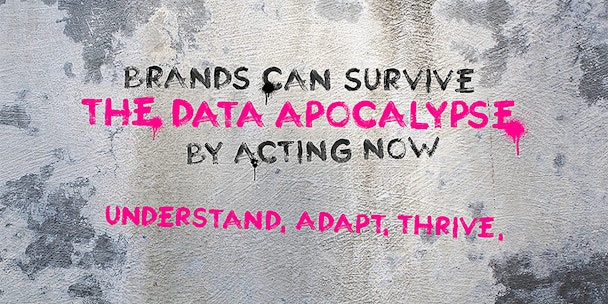How to survive the data apocalypse
Have you ever been asked for some personal information that seems utterly irrelevant, impertinent even?

How to survive the data apocalypse
If your answer is ‘yes’, your day is coming. It’s a revolution for consumers, a ‘data apocalypse’ for brands. Because under the GDPR (General Data Protection legislation) next May, brands will have to wipe the slate clean of ‘zombie’ data (ie data that hasn’t been specifically consented to for marketing during an average lifecycle for your brand) and woo their customers all over again.
We hardly need to tell you that data is fundamental to every brand’s business and customer relationships, but the scary thing is that our research found 70% of consumers don’t feel they’ve ever had value from sharing their data with any company. In fact, consumers are rebelling by withholding their data, opting out in increasing numbers. We talked to marketers too: most had heard of the GDPR, but 50% still aren’t ready for it even though it’s just 12 months away. The stakes are high. If brands get it wrong they face a fine of €2m or 4% of global turnover. No one wants to be the ICO test case.
If brands are to negotiate this new opt-in world successfully, and (even better) use this opportunity to leapfrog their competition, marketers need to grasp the nettle. It may sound like it’s an issue for the legal department to wrestle with, but actually the data apocalypse strikes at the heart of brand-customer relationships. It frames a sea change, from ‘customer relationship management’ – when marketers were in control and customers were ‘cultivated’ for revenue – to ‘customer managed relationships’, the new world where customers decide when, if and how deeply to engage with each brand they encounter. And so the emphasis is shifting to value: what value can a brand offer its customers to justify the exchange of personal data?
The data value exchange is all about demonstrating how the customer can benefit from sharing data using the three new value levers we have identified: ‘choice’, ‘control’ and ‘community’. For example, we asked customers how willing they were to share their spending/saving habits with an airline. Unsurprisingly, only 4% said they would. But when we applied the ‘control’ lever we increased this figure elevenfold: 45% were willing to share when we outlined a tailored offer, a ‘personalized travel itinerary based on my budget and preferences’. We’ve shown similar increases across eight sectors.
The second thing marketers can do is adapt the data value exchange to customers’ expectations of their relationship with your brand – because this differs by sector. Our research found four different relationships a customer can have with a brand: ‘functional’ (fulfill my basic needs), ‘supportive’ (advise and guide me), ‘creative’ (inspire me) and ‘personal’ (understand me). The ‘functional’ relationship applies to every sector, but the others vary. For example, ‘supportive’ describes subscription services such as banks and utilities, ‘creative’ is prominent in travel and beauty and ‘personal’ among very few brands, usually in fashion.
Adapting the data value exchange to the relationship for the sector is simple: we asked consumers how willing they’d be to share their location with a fashion brand. Unsurprisingly, only 7% expressed an interest. However, when we demonstrate the ‘personal’ relationship expectation with ‘exclusive in-store offers from a clothes store in return for my location and preferences’, interest shot up eightfold to 48%.
The last thing that marketers can do is reassess when data is collected: not in one all-encompassing, scary legal interaction (though privacy statements must still exist), but at the appropriate point in the customer’s journey, where it can genuinely enrich the customer’s experience. We call this progressive profile build the ‘data collection journey’: it’s an approach that has the potential to revolutionize customer engagement marketing.
Marketers have 12 months to transform this opportunity into the brand game-changer it has the potential to be. Remember there are three things you can do to tame this beast and ride it into the sunset:
1. Reflect the relationship consumers expect in their data value exchange.
2. Deliver genuine value in return for that data.
3. Reimagine data collection as part of your customer journey.
Are you in?
Jen Musgreave, planning partner, Rapp UK.
Tel: 0208 735 8016
Email: jen.musgreave@uk.rapp.com
Web: rapp.com
Twitter: @RAPP_UK
Content by The Drum Network member:

RAPP
RAPP is a global, data-driven creative community that builds direct, meaningful and high-value relationships between brands and people. At RAPP, with our unrivalled...
Find out more
